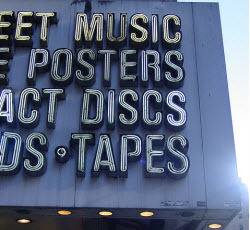Who Is Really Making Money When We Don’t Buy The Music We Listen To?
The new 21-year-old intern on NPR’s All Songs Considered claims to have only purchased 15 CDs in her entire life. This amounts to shocking news for some, probably because it doesn’t match our collective mental image of a true music enthusiast, especially one who works on a national radio show about music.
The passionate music enthusiasts I have known in my life have been, without exception, collectors. They scour the music scene for the next new thing or maybe an old awesome thing nobody remembers. They buy weird-smelling albums from stoop sales. They have milk crates full of music. I don’t even know where one gets milk crates! A cool music nerd of the caliber that could be hired by All Songs Considered should be like a musical Indiana Jones, right?
Emily the Intern is not a collector in the traditional sense. From her description, it sounds like she has amassed her gigabytes of music in huge chunks, looting digital copies of songs from her college radio station, senior prom date, and various family members.
And if it got deleted? She thinks she could probably recreate it fairly easily. She doesn’t have an emotional connection to the “collection.” She just likes listening to music.
From her article:
As I’ve grown up, I’ve come to realize the gravity of what file-sharing means to the musicians I love. I can’t support them with concert tickets and T-shirts alone. But I honestly don’t think my peers and I will ever pay for albums. I do think we will pay for convenience.
What I want is one massive Spotify-like catalog of music that will sync to my phone and various home entertainment devices. With this new universal database, everyone would have convenient access to everything that has ever been recorded, and performance royalties would be distributed based on play counts (hopefully with more money going back to the artist than the present model). All I require is the ability to listen to what I want, when I want and how I want it. Is that too much to ask?
Now, as you might have guessed by the fact that we are writing about it, not everyone is thrilled with Emily’s view of how the music industry should work.
The most lucid and polite (if lengthy) of the many responses to her article comes from David Lowery, of the bands Camper Van Beethoven and Cracker.
He makes quite a few points, but the most interesting one is this: Plenty of companies are making money off of what Emily the Intern is doing. (She paid for her laptop, internet access, etc.) It’s just that artists are not chief among them, and there is no market pressure that will help that change.
Mr. Lowery:
Say there is a neighborhood in your local big city. Let’s call it The ‘Net. In this neighborhood there are record stores. Because of some antiquated laws, The ‘Net was never assigned a police force. So in this neighborhood people simply loot all the products from the shelves of the record store. People know it’s wrong, but they do it because they know they will rarely be punished for doing so. What the commercial Free Culture movement (see the “hybrid economy”) is saying is that instead of putting a police force in this neighborhood we should simply change our values and morality to accept this behavior. We should change our morality and ethics to accept looting because it is simply possible to get away with it. And nothing says freedom like getting away with it, right?
But it’s worse than that. It turns out that Verizon, AT&T, Charter etc etc are charging a toll to get into this neighborhood to get the free stuff. Further, companies like Google are selling maps (search results) that tell you where the stuff is that you want to loot. Companies like Megavideo are charging for a high speed looting service (premium accounts for faster downloads). Google is also selling ads in this neighborhood and sharing the revenue with everyone except the people who make the stuff being looted. Further, in order to loot you need to have a $1,000 dollar laptop, a $500 dollar iPhone or $400 Samsumg tablet. It turns out the supposedly “free” stuff really isn’t free. In fact it’s an expensive way to get “free” music. (Like most claimed “disruptive innovations”it turns out expensive subsidies exist elsewhere.) Companies are actually making money from this looting activity. These companies only make money if you change your principles and morality! And none of that money goes to the artists!
And believe it or not this is where the problem with Spotify starts. The internet is full of stories from artists detailing just how little they receive from Spotify. I shan’t repeat them here. They are epic. Spotify does not exist in a vacuum. The reason they can get away with paying so little to artists is because the alternative is The ‘Net where people have already purchased all the gear they need to loot those songs for free. Now while something like Spotify may be a solution for how to compensate artists fairly in the future, it is not a fair system now. As long as the consumer makes the unethical choice to support the looters, Spotify will not have to compensate artists fairly. There is simply no market pressure. Yet Spotify’s CEO is the 10th richest man in the UK music industry ahead of all but one artist on his service.
Want more consumer news? Visit our parent organization, Consumer Reports, for the latest on scams, recalls, and other consumer issues.


